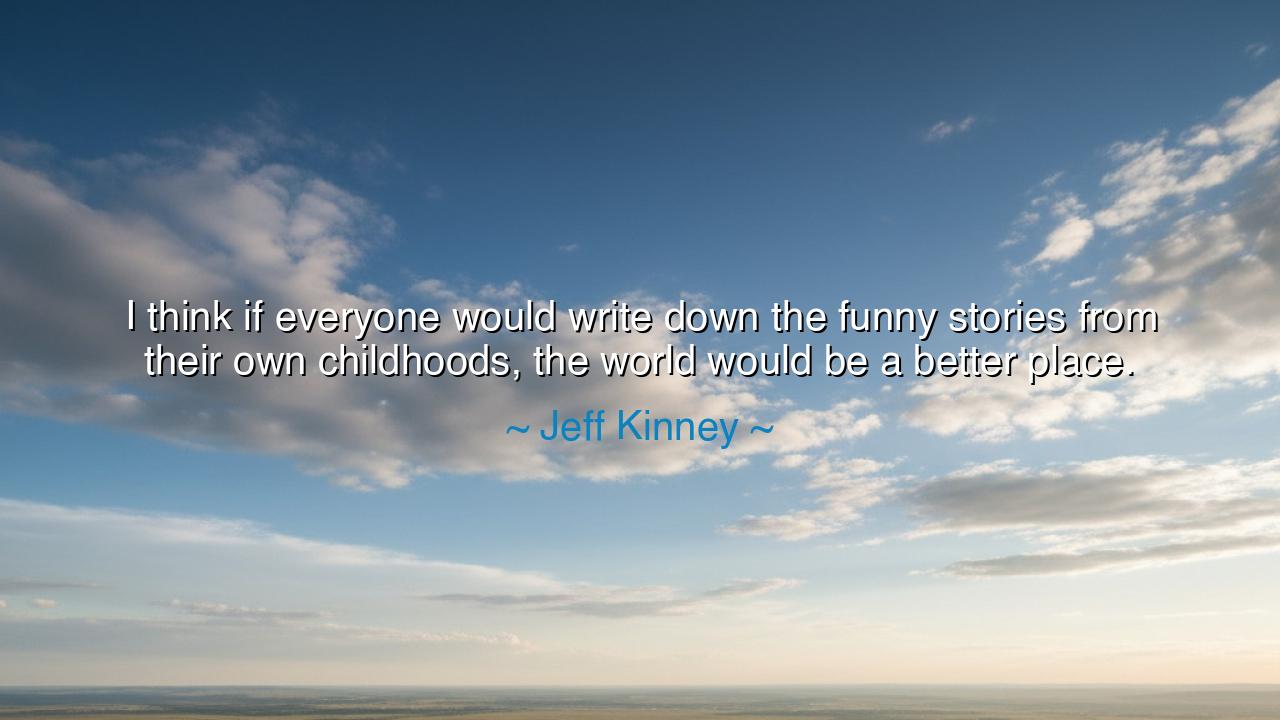
I think if everyone would write down the funny stories from their
I think if everyone would write down the funny stories from their own childhoods, the world would be a better place.






The storyteller Jeff Kinney, whose words have kindled laughter in the hearts of millions, once said: “I think if everyone would write down the funny stories from their own childhoods, the world would be a better place.” Though spoken with simplicity and humor, these words are not mere jest — they are a gentle revelation of timeless truth. For in that invitation to remember, to write, and to laugh, lies a path toward healing, unity, and understanding. Kinney, the chronicler of youthful misadventure in Diary of a Wimpy Kid, calls us to rediscover the sacred art of innocence — the laughter that makes us human before the world teaches us to be guarded.
To write down the funny stories of one’s youth is to perform a kind of magic. It is to reach back into the well of memory and draw forth light from the shadows. The child we once were — awkward, curious, foolish, pure — still lives within us, though often buried beneath the dust of pride and time. When we write, we speak to that forgotten self and allow it to breathe again. We remember that before ambition, before sorrow, we were creatures of wonder and play. Kinney’s call is not only for writers, but for all souls who wish to reclaim the joy of imperfection. Through humor, he reminds us that our clumsiness, our mistakes, our little embarrassments — these are not marks of shame, but the fingerprints of our humanity.
In ancient times, the philosopher Plato spoke of memory as the bridge between the mortal and the eternal. To remember truthfully, he said, was to touch the divine. But Kinney’s wisdom shows us that laughter, too, can be such a bridge. For when we laugh at our younger selves, we are not mocking but forgiving. The act of remembering our childhood stories turns pain into tenderness, foolishness into wisdom. It unites the past and present in compassion. This is why laughter has power: it transforms regret into gratitude and reminds us that even our smallest moments carry beauty.
Consider the story of Charles Dickens, who, long before he was the master of English literature, was a boy forced to work in a grim London factory. Those years might have filled him with bitterness, but instead, he turned them into stories — and through them, into light. His humor, even when born from hardship, softened the hearts of nations. Dickens understood what Kinney echoes: that when we tell our own stories — honestly, humorously, with warmth — we give others permission to see that their struggles, too, can be survived, even laughed at. The world becomes better because shared laughter dissolves the walls between souls.
Kinney’s quote also reminds us that humor is an act of courage. It is no small thing to look back and smile at the moments that once made us blush. In doing so, we reclaim power over the past. To laugh is to rise above. And when millions choose to share their laughter — their childhood mistakes, their silly dreams, their youthful fears — a collective humanity emerges. A world that laughs together becomes gentler, less divided. It learns to see not “others,” but reflections of itself. The funny stories become sacred threads, weaving the human family closer.
Yet his words also carry a challenge: in an age of noise, cynicism, and speed, will we pause long enough to remember? To pick up pen or keyboard and tell our own tales, unpolished and true? The act of writing our childhood stories is an act of slowing down — of giving honor to memory. It asks us to trade irony for sincerity, distraction for reflection. To write, as Kinney suggests, is to plant seeds of joy in a weary soil. And if enough people do so, those seeds might yet bloom into understanding, laughter, and peace.
So the lesson, my child, is this: write your stories. Do not wait until you are perfect, for perfection has no laughter in it. Write of the mud you fell in, the lie you told, the fear that made you cry and the friend who made you laugh again. In doing so, you honor the child you were and gift the world your humanity. For every tale of clumsy innocence, every foolish moment remembered with warmth, becomes a light to guide another through the darkness of seriousness and shame.
Therefore, take up your pen not as a scholar, but as a pilgrim of memory. Let your funny stories remind you — and others — that joy is not lost but waiting to be recalled. For in laughter born of honesty, the world softens; hearts open; and the weary remember that once, long ago, we were all children, stumbling through the same sunlight, learning to live, to err, and, most importantly, to laugh.






AAdministratorAdministrator
Welcome, honored guests. Please leave a comment, we will respond soon